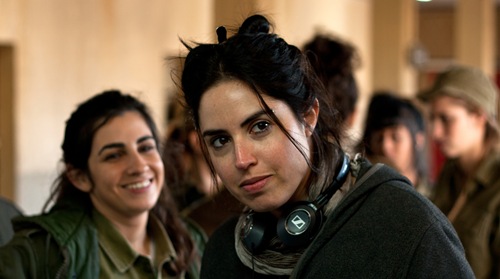What were the biggest challenges in making a feature film? How do people see compulsory military service in Israel? Was that Russian girl really possessed by a ghost? Writer/director Talya Lavie answers our questions about her award-winning film.
Zero Motivation, which won Best Narrative Feature at the Tribeca Film Festival, is a dark slacker comedy set in the Israeli military. You can read our review of it here.
The first feature-length film from writer-director Talya Lavie, Zero Motivation was inspired by her own military service. In the Director’s Note found in the movie’s press kit, Lavie writes that “Israeli women may of course serve in more glamorous roles, like pilots or tank crew instructors. But I wanted to focus on us office girls, the unseen and mostly ignored majority whose contribution is lacking any social or symbolic value.”
While promoting the film’s release in New York, she took the time to follow up on that statement, and to answer a few of our questions.
Bitch Flicks: Most of our readers are from the US and Canada, where the concept of mandatory military service is a little bit foreign, so I’m wondering if you could expand on that statement and talk about how you see the role of female conscripts in the Israeli military.
Lavie: Israel is one of the only countries that has mandatory military service for women as well as men. It creates a paradox because, on the one hand, it’s a symbol of equality but, at the same time, the IDF… still demonstrates real gender discrimination. There are women in combat roles but, as I said, the majority of women are still doing secretarial jobs. I believe this may change only if the army becomes less central in Israeli society – hopefully one day.
BF: In many ways, this is a coming of age story, but one that takes place within a very specific setting. (How) do you think that serving in the military has influenced the way these characters define themselves and develop as individuals?
Lavie: In a way, the army for those characters is what college is for Americans. Everyone participates and accepts it as a fact. It is, though, challenging to define your individual identity while having to wear the same uniform as everyone else, and to [live under these] rules. I guess it influences each person in a different way, like every other thing in life.
BF: While the film is very funny, there are a few darker moments in the story. How did you go about managing the changes in tone in the film?
Lavie: The film is defined as a “dark comedy” but, while writing the script, I didn’t want to lock myself into a specific genre. I put a large [range] of emotions in it, and was interested in mixing different spirits. Ultimately, my greatest challenge was to maintain the specific subtle tone of the film; to balance the transitions between humor, sadness, nonsense and seriousness. I felt like an acrobat in a circus walking on a rope, trying not to fall off, and yet to keep the film’s free spirit.
BF: I think the sequence where Irena is “possessed” by the spirit of the dead girl works really well on a metaphorical level, but inquiring minds want to know – was she really possessed by a ghost?
Lavie: All of the characters in the film have a very detailed biography that is not told in the movie – none of them gives a personal monologue. But their background is hinted at in many ways. In Irena’s character, we tried to hint that she has a history of violence. And when she sees Zohar nearly raped, it brings a very strong reaction out of her. Is she really possessed? I leave it for each viewer to decide for himself.
BF: What were some of the biggest challenges you faced in making this film, and do you have any advice for aspiring filmmakers?
Lavie: The biggest challenge was raising the budget for the film. It took several years. That stage in the creation of a film can be very frustrating for any first time filmmaker. My advice for filmmakers at this point is, in addition to applying anywhere you can, use that waiting time for learning and preparing for shooting. Eventually, when I look back on the process, that waiting period was frustrating but also useful for rewriting and studying. I came to the set very prepared. And since we had a very short time for shooting, [being prepared] was significant.
Thank you to Talya Lavie for taking the time to speak with us. Zero Motivation is currently playing in New York, San Francisco, Toronto, and other select cities in North America.

